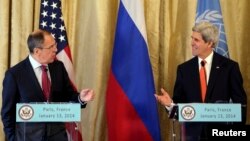U.S. Secretary of State John Kerry and Russian Foreign Minister Sergei Lavrov are meeting in Paris to plan for Syrian peace talks later this month, but they have not been able to agree on whether to invite Iran to the talks.
International mediator Lakhdar Brahimi said Monday he supports having Iran, Syria's biggest ally, at the talks. He said Iran is "a very important country in the region" and should be present for the negotiations. Syria's government also wants Iran at the talks.
The U.S. has said, through Kerry, that Iran must agree to support the establishment of a transitional government in Syria "by mutual consent," which is unlikely unless Syrian President Bashar al-Assad steps down.
Kerry said the question of Iran's participation is not a question of ideology, but of practicality and common sense.
In Monday's talks, Kerry, Brahimi, and Russian Foreign Minister Sergei Lavrov discussed a possible cease-fire, the possibility of prisoner exchanges, and allowing expanded access to humanitarian aid.
Kerry said he hopes the conference, which is scheduled to open January 22, will begin to bring an end to the "unspeakable conflict" that has raged in Syria for nearly three years. He said success would be a "good beginning" to the negotiations between the Syrian government and rebels trying to oust Assad, and not necessarily a final agreement.
Kerry reiterated that it is up to the opposing sides in Syria to come to an agreement and ultimately the Syrian people to decide on the political future of their country.
The stated goal of the so-called Geneva 2 conference is to negotiate a transitional government for Syria.
Assad's government has said it will attend, while the main opposition Syrian National Coalition says it will decide by the end of the week whether it will participate in the talks. Kerry said Sunday he is confident the opposition will attend.
International mediator Lakhdar Brahimi said Monday he supports having Iran, Syria's biggest ally, at the talks. He said Iran is "a very important country in the region" and should be present for the negotiations. Syria's government also wants Iran at the talks.
The U.S. has said, through Kerry, that Iran must agree to support the establishment of a transitional government in Syria "by mutual consent," which is unlikely unless Syrian President Bashar al-Assad steps down.
Kerry said the question of Iran's participation is not a question of ideology, but of practicality and common sense.
In Monday's talks, Kerry, Brahimi, and Russian Foreign Minister Sergei Lavrov discussed a possible cease-fire, the possibility of prisoner exchanges, and allowing expanded access to humanitarian aid.
Kerry said he hopes the conference, which is scheduled to open January 22, will begin to bring an end to the "unspeakable conflict" that has raged in Syria for nearly three years. He said success would be a "good beginning" to the negotiations between the Syrian government and rebels trying to oust Assad, and not necessarily a final agreement.
Kerry reiterated that it is up to the opposing sides in Syria to come to an agreement and ultimately the Syrian people to decide on the political future of their country.
The stated goal of the so-called Geneva 2 conference is to negotiate a transitional government for Syria.
Assad's government has said it will attend, while the main opposition Syrian National Coalition says it will decide by the end of the week whether it will participate in the talks. Kerry said Sunday he is confident the opposition will attend.












